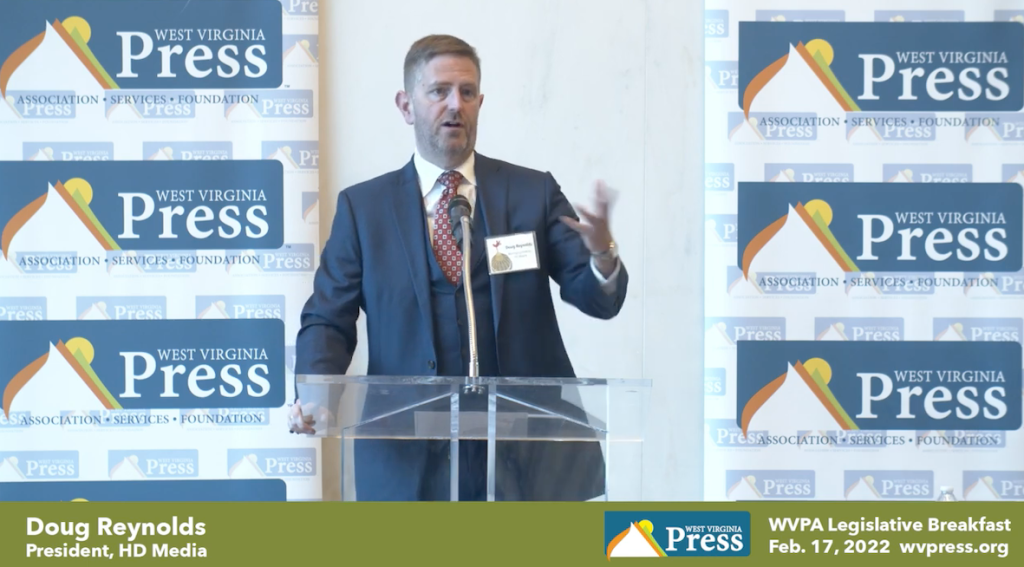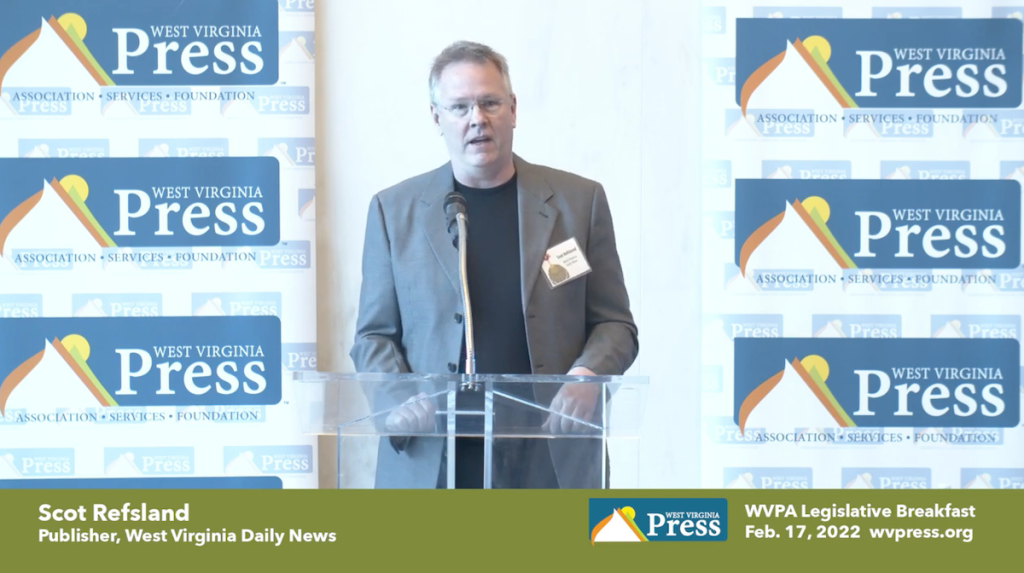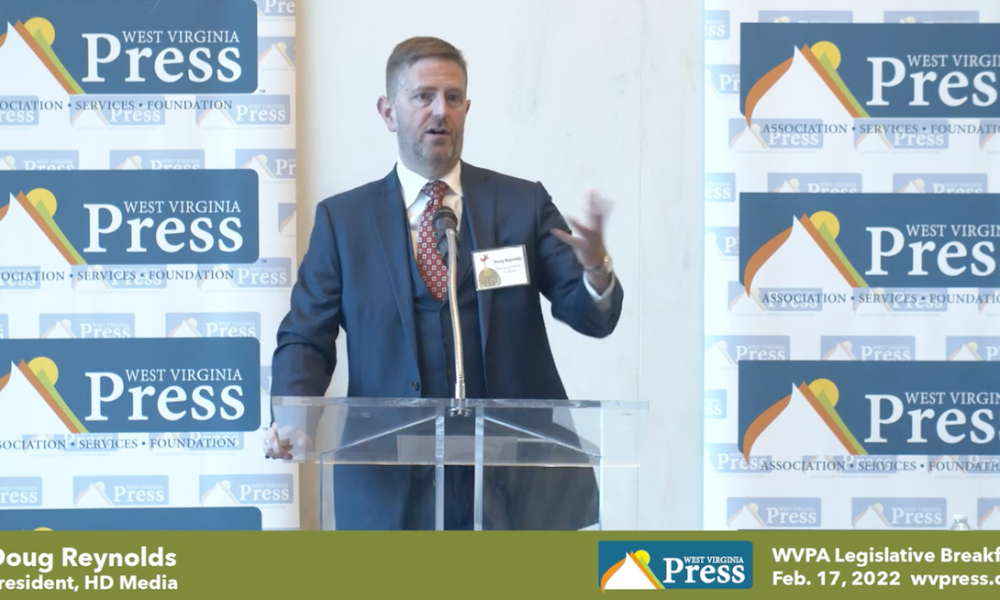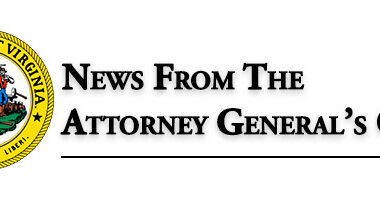By Matt Young, WV Press News Sharing
CHARLESTON, W.Va. – Representatives of newspapers in West Virginia got an update on the newspaper industry’s ongoing digital advertising lawsuit against Google and Facebook Thursday at the annual West Virginia Press Association Legislative Breakfast.
Doug Reynolds, managing director of HD Media, and Scot Refsland, publisher of the West Virginia Daily News., spoke as part of the business panel at the event, held at the Culture Center in Charleston.
Reynolds provided background information, as well as developmental updates regarding the newspaper industry’s ongoing digital advertising lawsuit against Google and Facebook.
Reynolds began his remarks by thanking the reporters covering the morning’s event.

“It’s incredibly important all the work that you do day after day after day,” Reynolds said. “But it’s unfortunate that the value you create for yourself and your news organizations, in the digital sphere, is being siphoned away. That value is being taken from you by Facebook and Google, and, in many cases, by third-parties that violate your copyrights, that create other websites and things like that, and Facebook and Google does nothing to stop it.”
As explained in a Dec. 7 article by Sara Fischer and Krystal Dixon for Axios, the antitrust lawsuit alleges that both Facebook and Google have “monopolized the digital ad market for revenue that would otherwise go to local news.”
Reynolds went on to explain that the intention of the lawsuit is to create and ensure the future safety of the “digital news ecosphere.”
“Right now, you create all this value,” Reynolds said. “And on the digital side, very little of that value accrues to the benefit of the news organizations in this room. And if we don’t change that (in the coming years), there will not be independent journalism. All information, all news will be portrayed as propaganda. Someone will pay to have that information put out in a manner that benefits them. Or, it will be the lowest denominator, most entertaining, whatever will generate the most amount of views.”
Reynolds advised that the lawsuit is now into the second year of what his attorneys have described as a potential 10-year legal battle, before going on to reference “Jedi Blue,” something that an October headline in New York Magazine called “Facebook’s shady deal with Google.”
As stated in the article written by Jacob Silverman: “Google and Facebook quietly agreed to use a Google-managed system for bidding on and managing online ads. Google would give Facebook preferential rates and first dibs on prime ad placement. Facebook would support Google’s efforts and decline to build competing ad technologies or to use header bidding. Both Google and Facebook would benefit while ensuring their continued co-dominance of the online ad market, from which they reap billions of dollars in annual profits.”
“This is stuff between Facebook and Google that’s been private, and this is stuff that’s been coming up in the litigation,” Reynolds said. “If you get a chance to read it, read the complaint.”

The morning’s final speaker, Scot Refsland, spoke of the industry’s need to embrace a more digital approach to news delivery. Refsland returned to West Virginia in 2017 after spending several years in the digital world of California’s Silicon Valley.
“I’ve been in the tech business since about ‘91,” Refsland said. “In ‘93, I moved to Australia and I worked for Apple Computers in their large-scale publishing systems. I was the first person to walk up to John Fairfax, who owns the Australian Financial Review and Sydney Morning Herald, and I literally cleaned out about four floors of people doing manual cut and paste, and I replaced that with computers and printers, and the whole technology. And that was the entrance of digital publishing in Australia.”
Refsland went on to say “Where we are at the moment in the digital publishing world – in the newspaper world – is that we’re at the point where we need to take the paper out of the newspaper, and create it into a news publishing company.”
According to Refsland, the industry must move away from the print-first model, and exist primarily within the digital space.
“I don’t read newspapers anymore,” he said. “Is there anybody who has a newspaper in their pocket? But, you do – you have a cell phone. We’re getting used to reading titles and summaries. You have a new device that’s giving you this information, and feeding it to you all the time, whereas newspapers don’t do that.”
Refsland summed up his point by saying “Newspapers have their place. The thing that I’m starting to realize is, not being from the newspaper part of it, but from the digital part of it, is that newspapers need to change. They need to come into where we are in the digital environment.”
The legislative breakfast was hosted by West Virginia Press Association in partnership with AARP WV, WVU University Relations, West Virginia International Yeager Airport, and the West Virginia Press Association Foundation.
See the full program video here: https://youtu.be/gsDRzaMrBrk






